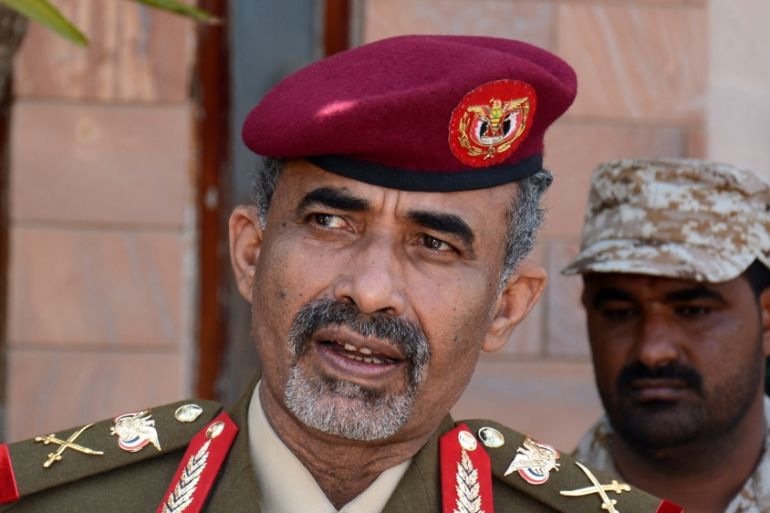Analysis: Can Aden replace Sanaa in Yemen?
The defence minister is joining ‘Hadi’s camp’ in Aden, currently considered the country’s de facto capital.

Nearly two weeks after the surprising escape of President Abd-Rabbu Mansour Hadi from Sanaa to Aden, the Houthis have been politically embarrassed once again by the astonishing escape of the defence minister, Major General Mahmoud al-Subaihi.
Although Subaihi was appointed by the Houthis to chair a national security committee, many Yemenis viewed his appointment as purely symbolic given that the real military power still lies in the hands of Houthi fighters. His escape comes as Saudi Arabia on Monday said the Gulf Cooperation Council (GCC) had agreed to host talks in Riyadh to end the crisis in Yemen, according to the state news agency SPA.
The defence minister will now join “Hadi’s camp” in Aden, which is currently considered the de facto capital city of Yemen. But can Aden replace Sanaa?
RELATED: The child soldiers of Yemen
There is no doubt that Aden has the basic required infrastructure to function as a temporary capital for a country like Yemen.
Indeed, the history of the city, its strategic location, and its use by former President Ali Abdullah Saleh as the commercial capital will make such a transition much easier. It is the legality of this move that is the real issue, as Article 157 of Yemen’s 1990 constitution adopts Sanaa as the capital city of the unified republic.
Consequently, Hadi cannot act unilaterally without a constitutional referendum to change the constitutional status of Sanaa. Nonetheless, several embassies – especially those of some GCC members – have moved to Aden since Hadi’s arrival, increasing the international isolation of the Houthis in Sanaa.
From Aden, Hadi has reasserted his commitment to a federal system in Yemen to foreign diplomats, several delegations of government officials, and citizens in Yemeni provinces not currently controlled by the Houthis.
The escape of the defence minister and Hadi's initial reaction to it has caused many Yemenis to wonder whether Hadi will be able to avoid his past mistakes and develop an overarching political and military strategy to counter the Houthis.
Hadi has also demanded the Houthis’ immediate withdrawal from Sanaa, to which they responded by declaring Hadi “a fugitive”.
The rising tensions between Hadi and the Houthi-Saleh alliance are reflected in the current status of the military. Yemen’s military institutions played a key role in the modern histories of both north and south Yemen before and after Yemen’s unification in May 1990.
The military institutions have been crucial in shaping the outcomes of uprisings in Yemen, but their support to activists has been divided. The overwhelming majority of Yemen’s special military forces remained loyal to Saleh, but Saleh’s top general and close friend, Ali Mohsen, joined the youth activists after the Friday of Karamah (Dignity) massacre in March 2011.
The subsequent defection of Moshen and several other top generals has caused a huge rift within the Yemeni military, splitting it between the pro-revolutionary forces under Mohsen’s leadership and the pro-Saleh forces. When Hadi was elected as the consensus candidate in February 2012, he inherited a divided military that was on the brink of a civil war. The two military camps had literally divided the capital city, with military checkpoints and a heavy military presence on both sides.
Hadi’s later attempt to restructure the military regrettably proved futile, although he had initially succeeded in removing the divisive military checkpoints from the capital city. His failure to streamline the military into a unified modern and professional institution was a result of the way Saleh had shaped Yemen’s armed forces.
Before the unification of Yemen, the military institution in the north enjoyed much greater financial and technical resources than its southern counterpart. The Yemeni military is currently spilt into three major camps or groups.
The first group includes military units that joined the Houthis and have remained under their control. Key militia leaders include Abu Ali al-Hakim, who has been subjected to a freezing of assets and a travel ban by the United Nations Security Council.
The second military group includes military units – particularly those in the special military forces – that remain loyal to Saleh and his family. The Houthis’ survival depends largely on their political and military coordination in the face of mounting international pressure and isolation.
|
|
However, it is possible that some top military officers within the special forces units may not approve of the alliance between Saleh and the Houthis and could join anti-Houthi forces at any time.
Finally, there are military units located in areas such as Taiz and the southern part of Yemen that are outside both the Houthis and Saleh’s influence.
These units opposed the Houthis’ military coup and still view Hadi as the legitimate leader of Yemen. A rapid restructuring of these units with anticipated monetary assistance from Saudi Arabia and other GCC members may help to reassure Yemenis who opposed the Houthi coup.
Hadi recently promised to punish Houthi leaders who unilaterally signed an aviation agreement with Iran to establish 14 weekly flights between Sanaa and Tehran. Many observers view this move as a calculated political and military tactic to ease any increased international isolation and to facilitate Iran’s direct military assistance to the Houthis.
The escape of the defence minister and Hadi’s initial reaction to it has caused many Yemenis to wonder whether Hadi will be able to avoid his past mistakes and develop an overarching political and military strategy to counter the Houthis. More particularly, will Hadi be more careful with respect to his personal security to avoid falling into the Houthis’ hands again?